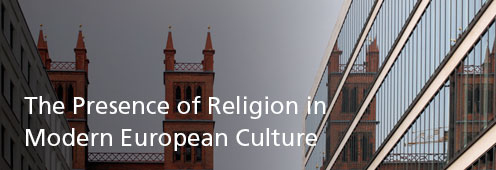The Presence of Religion in Modern European Culture

2 December 2016 10–17
Faculty of Theology, University of Copenhagen
Købmagergade 46, Lecture Hall (Auditorium) 7
Today, the much-voiced phrase “Religion in the Public Sphere” primarily points to the politically powerful presence of religion in society, whether seen as a positive or negative factor. Religion, however, has always had other kinds of public impact in society in addition to its existential-individual significations and its explicit socio-political impacts .. (read more below)
All are welcome.
Programme
10.15–11.15
Éric Palazzo, Université de Poitiers (France),
“The Modernity of the Synesthetic Medieval Liturgy”
11.15–11.30 coffee break
11.30–12.30
Miri Rubin, Queen Mary, University of London (UK)
“Medieval Mary's Global Reach”
12.30–14.00 Lunch break
14.00–15.00
Svein Aage Christoffersen, University of Oslo (Norway),
“Ambience and Representation – Between the Sacred and the Profane”
15.00–15.15 coffee break
15.15–16.15
Nils Holger Petersen, University of Copenhagen (Denmark),“The Sacred in Modern Western Music Culture”
General joint discussion
Today, the much-voiced phrase “Religion in the Public Sphere” primarily points to the politically powerful presence of religion in society, whether seen as a positive or negative factor. Religion, however, has always had other kinds of public impact in society in addition to its existential-individual significations and its explicit socio-political impacts. Historically as well as in contemporary societies, religion has had enormous influence indirectly in cultural contexts, neither in isolation from individual existential questions, nor from socio-political agendas, but constituting a field between or beyond such discourses.
Regardless of the personal beliefs or ideas of the individual, contemporary culture is replete with religious memorials and pointers: buildings, built for religious cults, as well as religious art from past and present are integrated parts of modern European city experiences. Literature, theatre, film, and music from past and present involve multifarious receptions, and (re-)interpretations, of religious heritage. Altogether and along the way, religious traditions have influenced numerous areas within the European cultures to a high extent, materially as well as in non-material ways, transformed, of course, in interactions and struggles with other important developing ideas and factors.
The cultural presence of religion in modern European cultures preserves traditional imaginative perceptions of existence and its meaning as well as connected ethical questions, often inspired by religions’ foundational narratives and theological constructions. Within this cultural presence, questions about the orthodoxy or heresy of thoughts and practices or their social validity are not determined authoritatively: they rather further the re-conception or re-thinking of the religious heritage, individually or collectively.
At the seminar, four leading scholars from European universities will give presentations about various aspects of the cultural impact of European religious traditions.
